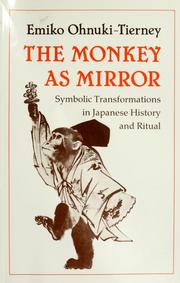| Listing 1 - 2 of 2 |
Sort by
|

ISBN: 0691094349 Year: 1987 Publisher: Princeton Princeton University Press
Abstract | Keywords | Export | Availability | Bookmark
 Loading...
Loading...Choose an application
- Reference Manager
- EndNote
- RefWorks (Direct export to RefWorks)
J4109 --- J4100 --- J4203 --- Animals and civilization --- -Buraku people --- Monkeys --- -Haplorhini --- Primates --- Aeta (Japanese people) --- Burakumin (Japanese people) --- Eta --- Eta (Japanese people) --- Special-village people (Japanese people) --- Tokushu burakumin (Japanese people) --- Caste --- Ethnology --- Civilization and animals --- Civilization --- Human-animal relationships --- Japan: Sociology, anthropology and culture -- theory, methodology and philosophy --- Japan: Sociology, anthropology and culture in general --- Japan: Sociology and anthropology -- communities -- social classes and groups -- outcasts, burakumin, hinin --- Social aspects --- Japan --- Civilization. --- Buraku people. --- Social aspects. --- -Japan: Sociology, anthropology and culture -- theory, methodology and philosophy --- Buraku people --- Haplorhini --- J4000 --- Japan: Social sciences in general, social history
Book
ISBN: 0520959167 9780520959163 9780520283282 0520283287 9780520283299 0520283295 Year: 2014 Publisher: Oakland, California
Abstract | Keywords | Export | Availability | Bookmark
 Loading...
Loading...Choose an application
- Reference Manager
- EndNote
- RefWorks (Direct export to RefWorks)
Since the 1980s, arguments for a multicultural Japan have gained considerable currency against an entrenched myth of national homogeneity. Working Skin enters this conversation with an ethnography of Japan's "Buraku" people. Touted as Japan's largest minority, the Buraku are stigmatized because of associations with labor considered unclean, such as leather and meat production. That labor, however, is vanishing from Japan: Liberalized markets have sent these jobs overseas, and changes in family and residential record-keeping have made it harder to track connections to these industries.
Working class --- Labor --- Multiculturalism --- Buraku people --- Cultural diversity policy --- Cultural pluralism --- Cultural pluralism policy --- Ethnic diversity policy --- Social policy --- Anti-racism --- Ethnicity --- Cultural fusion --- Aeta (Japanese people) --- Burakumin (Japanese people) --- Eta --- Eta (Japanese people) --- Special-village people (Japanese people) --- Tokushu burakumin (Japanese people) --- Caste --- Ethnology --- Government policy. --- Social conditions. --- Government policy --- Japan --- Politics and government --- J4203 --- J4352 --- Social conditions --- Japan: Sociology and anthropology -- communities -- social classes and groups -- outcasts, burakumin, hinin --- Japan: Economy and industry -- labor and employment -- social conditions --- Politics and government. --- anthropology. --- asia pacific modern series. --- buraka rights activists. --- buraku people. --- cultural studies. --- ethnographic research. --- global politics. --- historical. --- history of japan. --- history. --- international advocates. --- japan. --- japanese culture. --- japanese politics. --- japanese. --- labor of multiculturalism. --- labor. --- leather production. --- liberalized markets. --- managing difference. --- meat production. --- minority groups. --- multicultural japan. --- national homogeneity. --- political. --- prejudice. --- social movements. --- south asia. --- stigmatized groups. --- tanners. --- united nations.
| Listing 1 - 2 of 2 |
Sort by
|

 Search
Search Feedback
Feedback About UniCat
About UniCat  Help
Help News
News